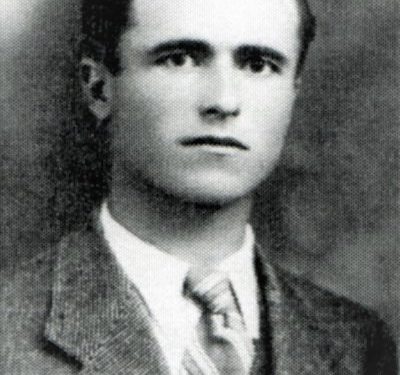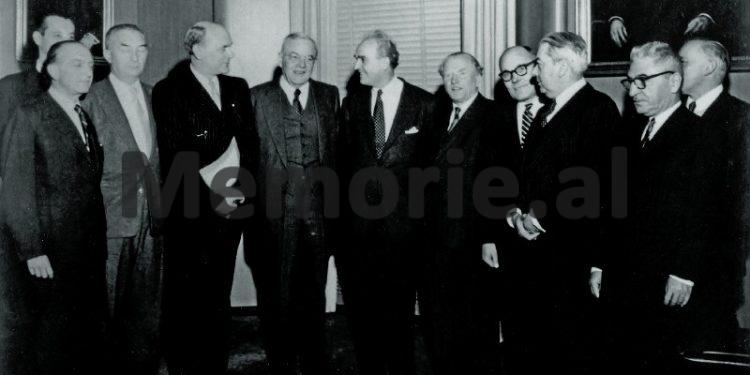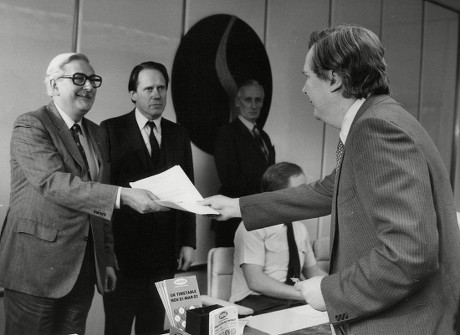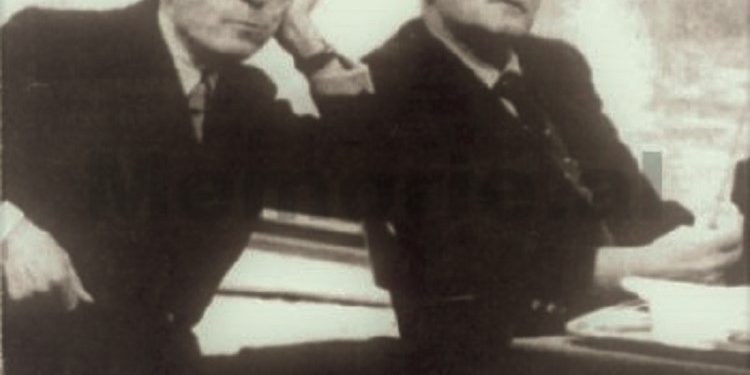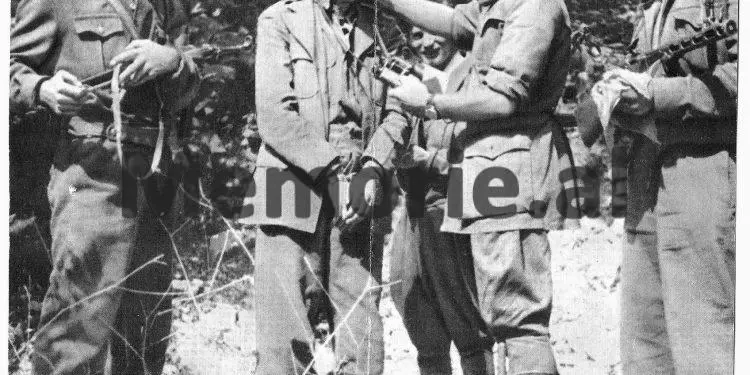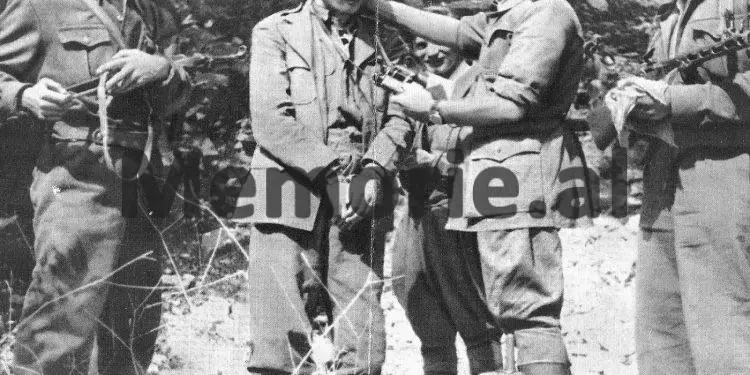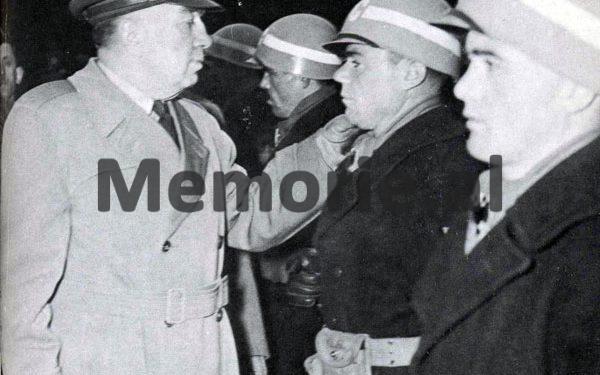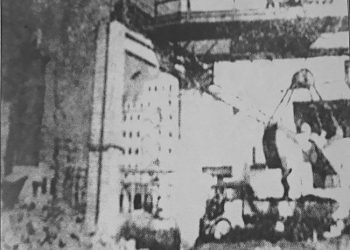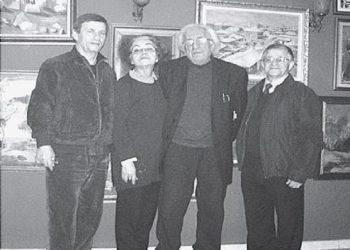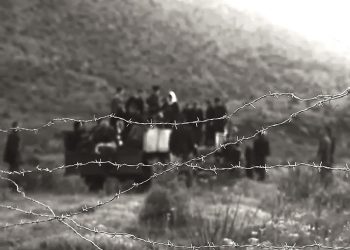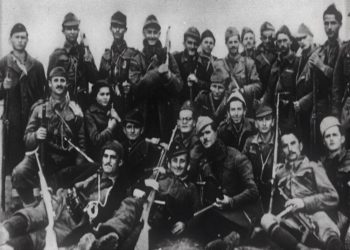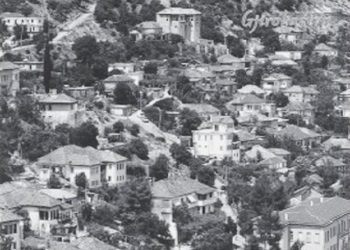The first part
Memorie.al / Abas Ermenji (1913-2003) were a political figure and anti-fascist resistance fighter during the Second World War. He was born in Skrapar and after being educated in Berat and Shkodër, he earned a right to study in France, where he attended higher studies at the Sorbonne University in 1934-1938, where he graduated in History. After returning to Albania in 1938, he was appointed as a lecturer at the Korça High School and in November 1939, for his anti-fascist activity (which he had openly demonstrated since April ’39), when he appeared in at the forefront of demonstrations against the fascist occupation, he was arrested by the Italians in Greece, when he was trying to assemble a fighting force, of Albanian internees, and was held in exile on the island of Ventotene in Italy, until 1941. On his second return in Albania, he became a leading figure of the Anti-Fascist Resistance Movement, as one of the main leaders of the nationalist organization “Balli Kombëtar” and with his armed forces; he took an active part in the battles for the liberation of the city of Berat, from Italian invasion. Ermenji was also an ardent anti-communist and when Enver Hoxha’s partisans came down from the mountains and took power in Albania, he fled to Greece (1946-1947) and then to Paris, where in August 1954, together with Vasil Andon, founded the National Democratic Anti-Communist Committee for Free Albania (“Free Albania”), which included many elements with nationalist tendencies who were in exile. Ermenji returned to Albania in 1991 when the communist regime collapsed and when “Balli Kombëtar” was re-founded and he led the party in the 90s. In the period 1949-1951, at the height of the Cold War, Abbas Ermenji was involved in the efforts of the Anglo-Americans to overthrow the communist regime of Enver Hoxha in Albania. He describes his involvement in the botched operation in the following two interviews with Lord Nicholas Bethell (1938-2007), author of The Great Betrayal: The Untold Story of Kim Philby’s Biggest Heist (London 1984).
Abaz Ermenji’s statement to the English Lord, Nicholas Bethell, in Paris on April 15, 1983 and July 23, 1983
During the war I fought with the “National Front”, in southern and central Albania. When the communists took over, I went underground with a small group of bodyguards and crossed into Greece at the end of 1945. I was first imprisoned by the Greeks in Thessaloniki and I believe they could have eliminated me because they knew about my firm, which had to do with the position I had taken on the issue of the southern borders of Albania. In April 1946, I was transferred to Piraeus and kept there as a prisoner of war.
Later I was allowed to live in a small apartment in Piraeus and other Albanians helped me to live. There I was approached by Julian Amery and others in early 1949 and they asked me to help form the “Free Albania” National Committee.
Amery and McLean said there was a danger that Yugoslavia and Greece would make a deal and march on Albania, since Tito was no longer an ally of Stalin and Albania was geographically isolated from the Soviet bloc. The Greeks did not want to let me leave the country and the British had to intercede with the Prime Minister to get permission for me to leave.
The Prime Minister agreed, but secretly, in order not to lose credit with the “vorio-epiris” supporters. I told Amery and Mclean that I accepted their proposal, but I wanted to consult with Mid’hat Frashër, who was in Istanbul at the time. Frashëri was the president of the “National Front” and would have to make the final decision. They issued me a passport with a false name and let me check in at Athens airport.
My problem in Rome was that I was living with false documents and members of the “Independent National Bloc” could have caught me. There were many of them in Rome and they had a great influence on the Italians. They had helped the Italian Fascists during the War. Their leaders were Ernest Koliqi and Ismail Vërlaci.
The Americans spoke to Midhat Frashëri in Istanbul and convinced him to allow the birders into the “Free Albania” Committee.
The American plan was for Frashëri to be the chairman of the Committee and Abbas Kupi to be the commander of the armed forces. We thought it was strange to have a president who wasn’t also commander-in-chief. Personally, I thought Abbas Kupi a capable commander, but very limited by his royalist convictions.
During the War, he was always very careful and did not expose himself. I loved it, I’m telling you honestly. He was very loving and wanted to be good friends. He obeyed Isahn Toptan’s orders.
Frashëri and I had tense talks with the Americans about who would be commander-in-chief. Several times we had to get up and leave the room. In the end, we came up with the idea of a presidency, consisting of: Abas Kupi, Said Kryeziu and me. Only after this agreement did the Italians agree to regularize my position and give me a refugee passport.
I think half of the fighters trained by the British and infiltrated into Albania returned safely, while almost all the fighters trained by America were killed or captured! There was no information leak from the Albanian side, but the operation was given and debunked by Kim Philby.
My main complaint is that we were cheated by the British and the Americans. They promised to provide us with the means to liberate our country. In fact, they trained only a small number of people. And they promised that they would win the cooperation of Greece and Yugoslavia.
I found most of our people in camps near Naples, others from Greece. They knew that I understood the situation in the country and they trusted me and volunteered to fight because I convinced them. Almost everyone agreed. They wanted to liberate their country and their families.
My idea was to gather considerable forces and parachute them into Albania. This was the only plan that could succeed. The groups that were sent were very small. If they had followed my plan, the whole people would have risen against the communists. This was the message that our groups brought: “Send a considerable force, five or ten thousand, then the whole people will rise in revolt.”
I went to Malta for a month in July – August, firstly to give them instructions, what to do and who to contact, secondly because, they would never have gone if I hadn’t asked them. However, I believed then, and I believe now, that no communist country could ever be overthrown by small-scale subversion methods.
In fact, the British and the Americans were treating Albania as a “pig”. If it had succeeded, they would have tried another country and another people. As for the suggestion that the operation helped suppress the communist rebellion in Greece, what I can say is that our goal was to liberate Albania, not Greece.
The operation continued with the forces of the “National Front” throughout 1950, but in 1951, I refused to help anymore. From then on, she continued mainly with birders. Then in December 1953, they tried to rebuild the Committee and include ex-fascists who had worked with the Italians. We refused to go with these. But by then we had been on bad terms with the British and the Americans for nearly two years.
In 1954, Zogu agreed to allow ten or twelve men from his Royal Guard to be parachuted into the Mati area. The bird had no qualms about sacrificing the lives of his close supporters. These men were all captured by the communists because Philbi had informed them. Messages were sent on their behalf, saying that “they were well received by the population”. This encouraged the Americans to send even more.
Then the communists executed not only the Albanians who had parachuted into the country, but also all those with whom they had contact, about 400 people in the area of Mati. They did so only at the end of the affair, after the Americans finally realized that their men had been captured by the forces of the communist regime.
* * *
Colonel Muharrem Bajraktari was a member of the Consultative Commission, not of the presidency. He did not play any serious role. During the War, he asked for £40 million to form a large pro-Allied army in the Balkans. He wanted to liberate Albania with gold.
The people we elected in 1949 had already participated in the fight against fascists and communists. They already knew how to fight and were brave, like most Albanians, as well as experienced in battles. I also chose them for their intelligence, their ability, to contact people, to prepare the way of liberation.
I wanted people who were skilled and knowledgeable in the field they were going to be operating in, skilled at forging links and gathering information. These were 30 people who went to Malta.
They knew it would be very dangerous, but they were willing to make any sacrifice. Our people had contacted senior officers of the Albanian army and were ready to abandon the regime. At that time, nobody in Albania thought that the regime would continue. Only the incomprehensible weakness of the British and Americans prevented it from collapsing.
Our supporters cheated us. They had no intention of seriously interfering. Their most serious failure was not to persuade Tito to accept our plan, allowing him to set up his own Committee under Tanef, a Slav and pro-communist. The Tanef Committee was the Yugoslav answer to our Committee. Yugoslavs would accept the overthrow of Enver Hoxha, only if he was replaced by a pro-Tito regime. They would not allow Albania to become democratic.
So when the British and Americans started sending their troops illegally into Albania, the Yugoslavs did the same and so did the Greeks. There was no coordination. The Italians also sent a group led by Alush Lleshanaku, who was a supporter of Ismail Vërlac, the son of the man who had been prime minister of Albania under the Italian occupation. They were the richest family in Albania. Vërlac was succeeded as prime minister by Mustafa Kruja, who was more intelligent. Lleshanakut group was liquidated.
We had hundreds of Albanian political immigrants who were ready to go to Albania and fight, maybe even thousands. When I went to the camps near Naples, to choose these people, there was dissatisfaction, because I had chosen only those 30 and not the others. Everyone wanted to go. We could have thousands of Albanians – and others too, Bulgarians, Croats, a force large enough to free our country from the communist yoke.
The method chosen by the British and Americans could never have worked. It was no good sending landing parties of four or five men to look for local leaders to start a revolution. All these people had already been destroyed by the communists. We should have sent thousands and created zones of anti-communist opposition to the regime.
We could only recruit as many people as our supporters requested. The British told us they wanted 30 men for Malta. The Americans told us they wanted a company of 200 in Germany. So we couldn’t afford to put more men into the war.
I myself did not go to Naples. I sent someone and gave them the names. And they were under orders not to speak a word about it to anyone else, not even to their brothers.
All immigrant Albanians were enthusiastic in those days. The British and the Americans should have taken what I told them seriously.
The people we selected went to the training camp in Malta in July and August of that year. I didn’t go there myself until September. I had problems with the Italians for the visa. My impression in Malta was that the British instructors were good and that my people were full of enthusiasm. I was there for a month and left after the first landing group was sent to Albania, after the death of Frashër.
David Smiley, that was very nice. However, the British did not accept some of my terms. I wanted the landing party leaders to report to me first, then to the British. I said that Albanians should give their first loyalty to other Albanians.
And they would be more honest with us. Our interests may not always be the same as British interests, let alone Greek or Yugoslav interests. The matter was only resolved when a senior British officer intervened and then allowed the landing parties to go.
I was glad because a few months later, this officer invited me to dinner in Rome, on my way to the Middle East. He told me that he had told his colleagues in London: “When you work with representatives of other peoples, don’t assume that their interests are always the same as British interests.”
The British training was very good, more serious than the American one. And British security was better. This was due to the fact that Malta was an island and because the Americans had faith in the birders, who were a group without order, discipline or sophistication.
Also, the British made better arrangements for sending landing groups to Albania. I saw the first boarding in October 1949 and was impressed. There has never been any accident with the sending of our paratroopers by the British to Albania.
September 1949 was a time of great hope. I started by staying with Colonel Smiley and his family at their home in Malta. Then after a few days, I moved to the fort. Captain Jani Dilo was the man who mainly dealt with the trainees. I informed each group leader.
Then I returned to Rome, where I lived in Corso Trieste. I returned to Malta a year later and already had my doubts. I tried not to create false hopes with the landing party leaders. By the middle of 1951, I was sure it wasn’t going to work. Memorie.al
The next issue follows




